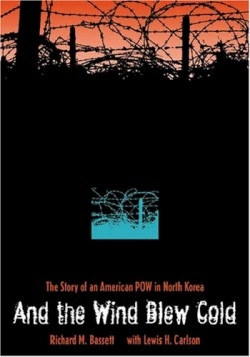
And the Wind Blew Cold
The Story of an American POW in North Korea
On October 6, 1951, the author was captured by the Chinese People’s Volunteer Army while fighting in the Korean War. He spent twenty-two months as a prisoner, one of 7,245 Americans captured there. Bassett recalls almost every day of his captivity in Camp 5, which held more prisoners than any other Chinese or North Korean camp. He describes the shock of being captured and the lengthy march during which many soldiers died of hunger, cold, wounds, and cruel treatment. He writes of the suffering at the hands of the Chinese who sought to mentally break the prisoners in the hope of exploiting them for propaganda purposes.
“Sometimes the Chinese would get one of us up at one or two o’clock in the morning to grill us and they would try to get us to draw maps of military installations.” Bassett drew a map of Tampa Bay and told them it was an important military base. The author recounts a typical day: arduous work; a diet consisting mostly of barley, turnips, potatoes, and rice; cramped housing in shacks; and the few religious, social, and recreational diversions. He would read from a Bible he carried in his pocket; the POWs would sing hymns and pray. A group of prisoners formed a church where services were held during the weekdays and on Sunday.
Each season had its pests, Bassett says. In the winter it was lice; in summer came the bedbugs, rats, and flies. “To keep the flies down,” he writes, “the Chinese offered a prize of one cigarette for each 100 flies killed.” Some of the prisoners smoked marijuana; the plant grew wild in the hills. “They would trade anything to get it, even stuff that didn’t belong to them, such as soap, tobacco, combs, or mirrors,” Bassett recalls.
On August 12, 1953, Bassett was repatriated, riding in a vermin-infested train to freedom. He was handed over to United States Army personnel and Red Cross officials in Panmunjom, and he recalls the joy of eating his first dish of ice cream. In an epilogue, Bassett describes the impact that incarceration has had on his life in Florida. He has suffered from Post-Traumatic Stress Disorder, severe hearing loss, and other problems. Looking back, Bassett writes that he is “neither a hero nor a coward, just a survivor.” More than 3,700 POWs died in what has been called the Forgotten War. This vivid, clear-sighted account will help keep it from being forgotten altogether.
Reviewed by
George Cohen
Disclosure: This article is not an endorsement, but a review. The publisher of this book provided free copies of the book to have their book reviewed by a professional reviewer. No fee was paid by the publisher for this review. Foreword Reviews only recommends books that we love. Foreword Magazine, Inc. is disclosing this in accordance with the Federal Trade Commission’s 16 CFR, Part 255.
